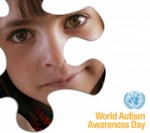
A growing number of countries heralded a new call for involvement in addressing autism and other developmental disorders that affected millions of individuals and their families and societies worldwide as the United Nations and communities around the globe marked World Autism Awareness Day on 2 April with commemorative events including film screenings, panel discussions and live performances.
“This international attention is essential to address stigma, lack of awareness and inadequate support structures,” said United Nations Secretary-General Ban Ki-moon in a message to mark the Day. “Current research indicates that early interventions can help persons with autistic conditions to achieve significant gains in their abilities. Now is the time to work for a more inclusive society, highlight the talents of affected people and ensure opportunities for them to realize their potential.”
In December 2007, the United Nations General Assembly unanimously adopted resolution A/RES/62/139, declaring 2 April World Autism Awareness Day to highlight the need to help improve the lives of children and adults who suffer from the condition, so they can lead full and meaningful lives. The rate of autism — a lifelong developmental disability that manifests itself during the first three years of life — is high in all regions of the world, and it has a tremendous impact on children, their families, communities and societies. The number of children and adults with autistic conditions continues to rise across every nation and social group.
“Let us remind ourselves that together — whether we represent Governments, civil society, the private sector or the United Nations itself — we can make a significant difference in our collective goal to create a more caring and inclusive world for people with autism,” said Peter Launsky-Tieffenthal, Under-Secretary-General for Communications and Public Information.
Children and adults with autism face major barriers associated with stigma and adverse discrimination, lack of access to support, discrimination, abuse and isolation, all of which violate their fundamental human rights, according to a General Assembly resolution (document A/RES/67/82) sponsored by Bangladesh and adopted in December 2012. Giving young children the early and correct treatment is crucial for improving their prognosis and giving them the chance to maximize their potential, according to the text.
Those issues were explored during two panel discussions, co-organized by the United Nations Department of Public Information and the Permanent Mission of the Philippines. Panellists addressing their respective themes, “Finding the ability in the disability of autism” and “Successful transition to adulthood”, were Stephen Shore, Professor of Special Education at Adelphi University; Elaine Hall, founder of The Miracle Project, a groundbreaking theatre arts programme for autistic individuals profiled in the award-winning HBO documentary AUTISM: The Musical; Neal Katz, a teenager with autism who was featured in that film; Fazli Azeem from Pakistan, a graphic design Fulbright Scholar in Boston who is on the autism spectrum; and Idil Abdull from Somalia, who has a child with autism.
That segment of the event featured musical performances by Talina and The Miracle Project. It included performers with autism and remarks by Mr. Launsky-Tieffenthal, who also opened a book-signing event at the United Nations Bookstore with Stephen Shore, author of Beyond the Wall.
While public awareness remains low, global awareness of autism is growing. The new General Assembly resolution demonstrates a commitment to helping affected individuals and families, and encouraging Member States and others to strengthen research and expand delivery of health, education, employment and other essential services.
A related panel discussion titled “Addressing the socioeconomic needs of individuals, families, and societies affected by autism spectrum disorders and other developmental disorders” was held on the new resolution’s implementation. It is co-organized by the Permanent Missions of Bangladesh, Bahrain, India, Qatar, Saudi Arabia and the United States, in collaboration with the Department of Public Information and UN DESA. On 4 April, the Permanent Mission of Israel will host a screening of the film This Is My Child at 1:15 pm in Conference Room E of the North Lawn Building.
Source: UN News Release
